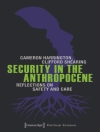Judith Nora Hardt works as a postdoctoral researcher with the Franco-German research centre for social sciences Centre Marc Bloch. In 2014, Judith received her Ph D (Dr. Phil) in International Relations from the University of the Basque Country (Spain). She worked as a lecturer in International Relations, Nature Conservation and Socioeconomics at the Eberswalde University for Sustainable Development (Germany) and has been part of the research group “Climate Change and Security” at the University of Hamburg since 2017. She is also an associated researcher at the Institute for Peace Research and Security Policy. Since March 1st 2021, she has been the project manager of the three-year Franco-German project Multiple Crises: Covid-19 and the Entanglements of Public Health, Security and Ecology in Europe, funded by the Federal Ministry of Education and Research. She is active in the Network of Scientists for Future. Her book Environment and Security in the Anthropocene: Assessing Theory and Practice was published with Routledge in 2018.
Cameron Harrington is an Assistant Professor of International Relations at the School of Government and International Affairs, Durham University. He is a researcher and analyst of global environmental politics. In particular, he draws from international relations, political philosophy, criminology, and human geography and focuses on the theory and practice of environmental security, particularly water conflict and cooperation in the Anthropocene. His book, Security in the Anthropocene: Reflections on Safety and Care, co-written with Clifford Shearing, was published by Transcript-Verlag in 2017.
Franziskus von Lucke is a postdoctoral researcher at the Institute of Political Science at the University of Tübingen. His research focuses on international relations, critical security studies, ontological (in)security, European studies, and theories of climate (in)justice. He has worked extensively on securitization theory with a particular focus on the entanglement of securitizing moves and political power, as well as on the securitization of climate change in different national settings. He has also looked at the European Union and has explored whether and how the EU has contributed to global climate (in)justice and how narratives of ontological (in)security connect to different forms of solidarity in Europe. Besides appearing in Geopolitics, the Journal of International Relations and Development, Political Geography and in the Zeitschrift für Internationale Beziehungen (ZIB), two of his books deal with the linkages between climate change and security: The Securitisation of Climate Change and the Governmentalisation of Security (Palgrave, 2020), and The Securitisation of Climate Change: Actors, Processes and Consequences (Routledge, 2016, together with Thomas Diez and Zehra Wellmann).
Adrien Estève is a postdoctoral researcher at the Center for International Studies (CERI-CNRS- Sciences Po Paris) and a resident at the Institute for Strategic Research (IRSEM). His research focuses on the implications of security and defence actors in defence policies, on the emergence of international forums and networks on climate security, and on the evolution of forms of conflict (lawfare). He oversees the research seminar “Environment and International Relations” at CERI. He was also a visiting scholar at Columbia University for the academic year 2017-2018 and again in April 2019. His research studies the involvement of military actors in climate change governance, and his latest article focuses more specifically on the French armed forces. Nicholas Simpson is a Senior Advisor at the Global Centre for Climate Mobility and is the Lead for Knowledge & Practice at the Africa Climate Mobility Initiative. He holds research association with the University of Cape Town. His complex climate risk framework underpins the new risk framework of the Intergovernmental Panel on Climate Change (IPCC) 6
th Assessment and is being used to guide climate risk assessment by a diversity of security actors including the Belgian government’s National Security Council and research planning on energy security by the U.S. Department of Energy. His previous research extended security studies to explore how and why resilience has been employed as a means of understanding and responding to unanticipated and severe Anthropocene events. He is a Lead Author on the Africa chapter of the IPCC and a member of the extended writing team of the IPCC Synthesis Report. He is an Associate Editor for the journal
Climate Risk Management. The recently published, Criminology and Climate, (Routledge) features his work on Insurance in the Anthropocene.
2 Ebooks par Cameron Harrington
Cameron Harrington & Clifford Shearing: Security in the Anthropocene
The belief that »Nature« exists as a blank, stable stage upon which humans act out tragic performances of international relations is no longer tenable. In a world defined by human action, we must reo …
PDF
Anglais
€79.99
Judith Nora Hardt & Cameron Harrington: Climate Security in the Anthropocene
The speed and scale of climate change presents unique and potentially monumental security implications for individuals, future generations, international institutions and states. Long-dominant secur …
PDF
Anglais
€96.29


